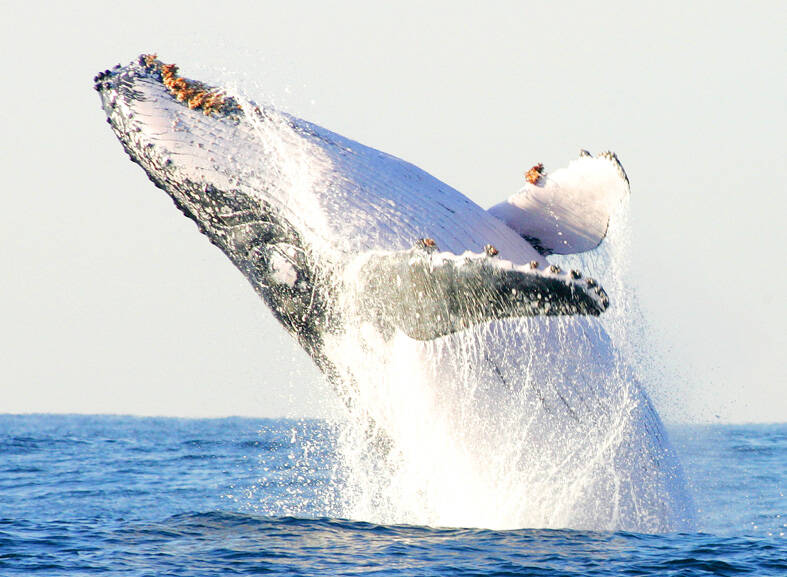UN member states on Saturday after years of negotiations agreed to a text on the first international treaty to protect the high seas, a fragile and vital treasure that covers nearly half the planet.
“The ship has reached the shore,” conference chair Rena Lee announced at the UN headquarters in New York shortly before 9:30pm, to loud and lengthy applause from delegates.
The exact wording of the text was not immediately released, but activists hailed it as a breakthrough for the protection of biodiversity after more than 15 years of discussions.

Photo: Reuters
The treaty is seen as essential to conserving 30 percent of the world’s land and ocean by 2030, as agreed by world governments in a historic accord signed in Montreal in December last year.
“This is a historic day for conservation and a sign that in a divided world, protecting nature and people can triumph over geopolitics,” Greenpeace Nordic Polar adviser Laura Meller said.
European Commissioner for the Environment, Oceans and Fisheries Virginijus Sinkevicius yesterday called the treaty “a crucial step forward to preserve the marine life and biodiversity that are essential for us and the generations to come.”
Following two weeks of intense talks, including a marathon overnight session from Friday into Saturday, delegates finalized a text that cannot be significantly altered.
“There will be no reopening or discussions of substance,” Lee told negotiators.
The agreement is to be formally adopted once it has been vetted by lawyers and translated into the UN’s six official languages, said Lee, who is also the Singaporean ambassador for Oceans and Law of the Sea Issues.
UN Secretary-General Antonio Guterres commended the delegates, a spokesperson said, adding that the agreement was a “victory for multilateralism and for global efforts to counter the destructive trends facing ocean health, now and for generations to come.”
The high seas begin at the border of countries’ exclusive economic zones, which extend up to 200 nautical miles (370km) from coastlines. They thus fall under the jurisdiction of no country.
Even though the high seas comprise more than 60 percent of the world’s oceans and nearly half the planet’s surface, they have long drawn far less attention than coastal waters and a few iconic species.
Ocean ecosystems create half the oxygen humans breathe and limit global warming by absorbing much of the carbon dioxide emitted by human activities, but they are threatened by climate change, pollution and overfishing. Only about 1 percent of the high seas are currently protected.
When the new treaty comes into force, it would allow the creation of marine protected areas in these international waters.
The treaty would also oblige countries to conduct environmental impact assessments of proposed activities on the high seas.

Tropical Storm Gaemi strengthened into a typhoon at 2pm yesterday, and could make landfall in Yilan County tomorrow, the Central Weather Administration (CWA) said yesterday. The agency was scheduled to issue a sea warning at 11:30pm yesterday, and could issue a land warning later today. Gaemi was moving north-northwest at 4kph, carrying maximum sustained winds near its center of up to 118.8kph and gusts of 154.8kph. The circumference is forecast to reach eastern Taiwan tomorrow morning, with the center making landfall in Yilan County later that night before departing from the north coast, CWA weather forecaster Kuan Shin-ping (官欣平) said yesterday. Uncertainty remains and

SEA WARNING LIKELY: The storm, named Gaemi, could become a moderate typhoon on Wednesday or Thursday, with the Taipei City Government preparing for flooding A tropical depression east of the Philippines developed into a tropical storm named Gaemi at 2pm yesterday, and was moving toward eastern Taiwan, the Central Weather Administration (CWA) said. Gaemi could begin to affect Taiwan proper on Tuesday, lasting until Friday, and could develop into a moderate typhoon on Wednesday or Thursday, it said. A sea warning for Gaemi could be issued as early as Tuesday morning, it added. Gaemi, the third tropical storm in the Pacific Ocean this typhoon season, is projected to begin moving northwest today, and be closest to Taiwan on Wednesday or Thursday, the agency said. Today, there would likely

DISRUPTIONS: The high-speed rail is to operate as normal, while several airlines either canceled flights or announced early departures or late arrivals Schools and offices in 15 cities and counties are to be closed today due to Typhoon Gaemi, local governments announced last night. The 15 are: Taipei, New Taipei City, Taoyuan, Tainan, Keelung, Hsinchu and Kaohsiung, as well as Yilan, Hualien, Hsinchu, Miaoli, Chiayi, Pingtung, Penghu and Lienchiang counties. People should brace for torrential rainfall brought by the storm, with its center forecast to make landfall on the east coast between tonight and tomorrow morning, the Central Weather Administration (CWA) said. The agency issued a sea warning for the typhoon at 11:30pm on Monday, followed by a land warning at 11:30am yesterday. As of

CASUALTY: A 70-year-old woman was killed by a falling tree in Kaohsiung as the premier warned all government agencies to remain on high alert for the next 24 hours Schools and offices nationwide are to be closed for a second day today as Typhoon Gaemi crosses over the nation, bringing torrential rain and whipping winds. Gaemi was forecast to make landfall late last night. From Tuesday night, its outer band brought substantial rainfall and strong winds to the nation. As of 6:15pm last night, the typhoon’s center was 20km southeast of Hualien County, Central Weather Administration (CWA) data showed. It was moving at 19kph and had a radius of 250km. As of 3pm yesterday, one woman had died, while 58 people were injured, the Central Emergency Operation Center said. The 70-year-old